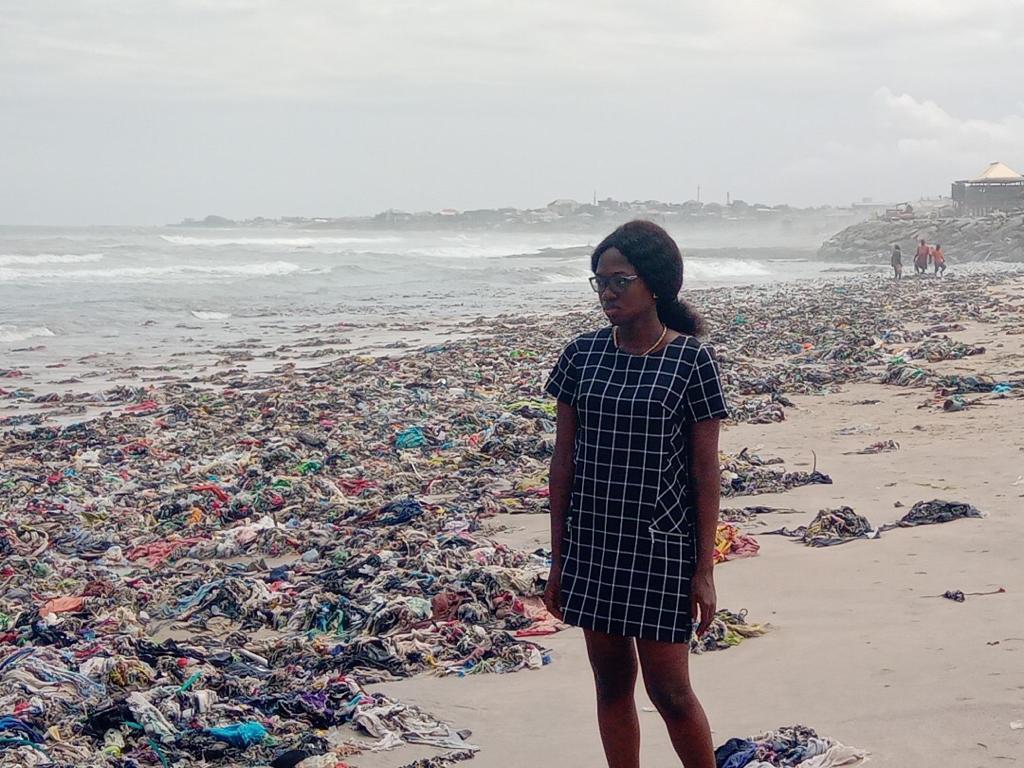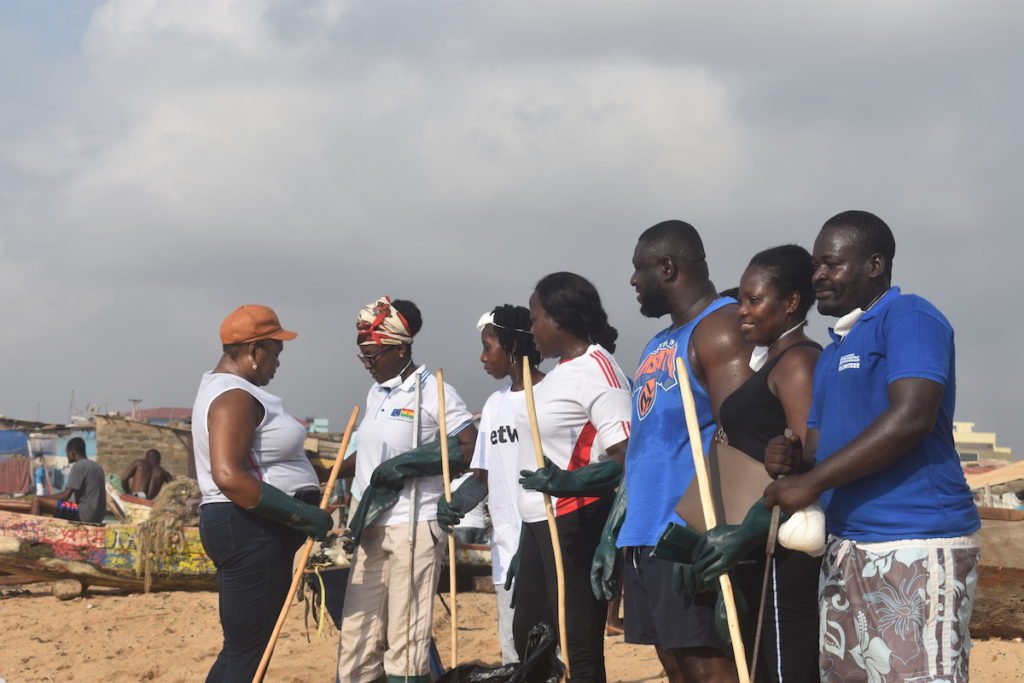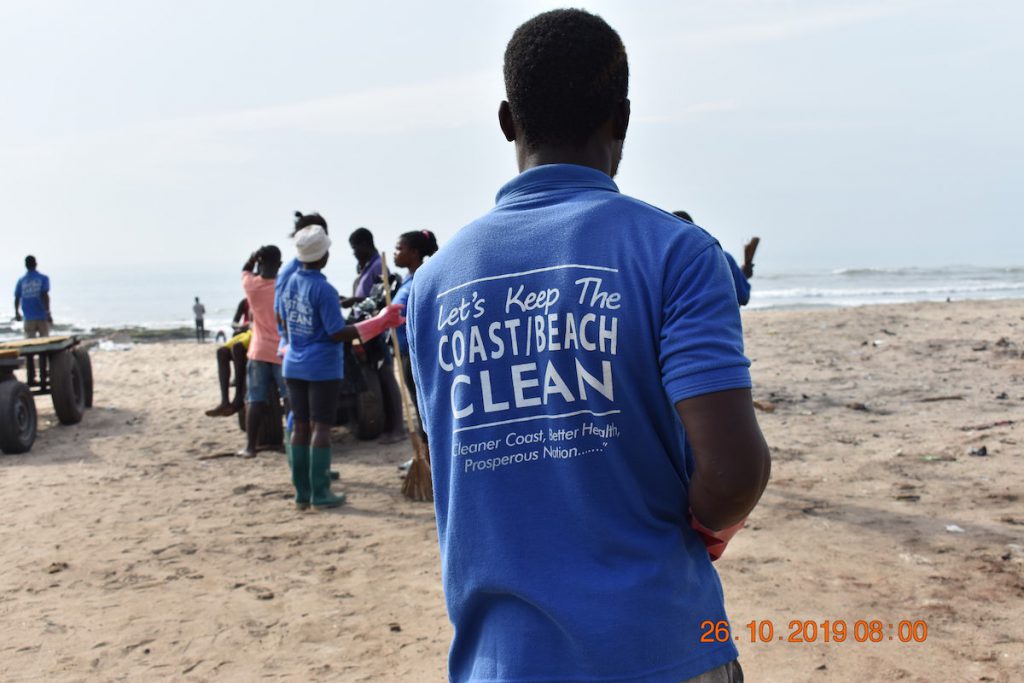Executive Director's Message
“What should be some of the most beautiful, were turning into some of the dirtiest beaches in Ghana and it was frustrating to see the degradation of our coastline and beaches in need of improvement and not being able to help”
Adjoa Saaba Eshun
Never before has there been so much concern for our environment and coastal habitat than now. Get involved now!!!

Clean Coast /Beach Project
Do beach cleanups really make a difference? Questions have been raised as to whether the occasional organized beach cleanups really make any difference.
Over the years, we have all been witnesses to our politicians, celebrities, diplomats and people from all walks of life occasionally giving their time to clear rubbish and raise awareness as part of campaigns to rid our coastline and beaches of filth/trash. The reality is, organized cleanups only remove a very small proportion of the trash out there.
These occasional campaigns and other marine stewardship activities has not made the desired impact since they are not regular and sustainable.
Others argue that, organized beach cleanups do not address the root causes of this pollution. That, cleaning a beach is not turning the tide, the say, because the next rain or tide, will just deposit more rubbish to the beach.
However, there is compelling evidence that cleanup campaigns, do make a difference. There is no denying the fact that beach cleanups create momentum, raise awareness and save threatened habitats.
A Clean Coast/Beach preserves our natural treasures, keep toxic chemicals out of the water/sea, help the local economy, create a safer environment and gives us the opportunity to dispose of waste the right way, that is, to recycle and compost what we can.
Marine litter is the most serious consequence of inadequate waste resource management on land. Nearly eighty (80) percent of marine litter/trash originate from our communities and households, and are mostly plastics.
Sources are manifold, but in all cases, the phenomenon is linked to insufficient waste management infrastructure and people’s attitude towards the handling of wastes.
It is nonetheless critical to seek a long-term cure even while dealing with the symptoms of this toxic pollution at our beaches. As with all existential environmental challenges we face today, everyone has a role to play, government, industry and civil society organization.
The quality of Ghana’s coast/beaches has deteriorated substantially over the years as a result of marine litter and other human activities, and it is frustrating to see the degradation of our coastline and beaches in need of improvement and not being able to help.
Beaches provide lots of opportunities for recreation for people from all walks of life, and cater to varying interests. Families and friends, as well as tourists spend much of their time year-round on the beaches.
Visits to most coastal communities indicate very high disregard for basic sanitation practices, resulting in pile up rubbish/trash rejected by the sea and those left behind by visitors and tourists.
Within these coastal communities dependent on tourism, the filthy conditions prevailing, seem the most important environmental issue confronting them, as visitors and tourism figures keep dwindling due to the perennial insanitary conditions at the beaches, and hoping something could be done to arrest this situation, to ensure sustainable development.

 There is, definitely, economic benefits to a clean beach, but, if our beaches are covered with trash/litter, tourists will not come. Nobody wants to go to a beach littered with plastic bottles and rubbers, discarded nets and faeces.
There is, definitely, economic benefits to a clean beach, but, if our beaches are covered with trash/litter, tourists will not come. Nobody wants to go to a beach littered with plastic bottles and rubbers, discarded nets and faeces.
After participating in several cleanup activities within the Greater Accra Region, for some time, and moving into a community overlooking a beach and realizing the extent of the plastic pollution, and its attendant health implications on the people in the community, I decided to act.
Coastal Conservancy Organization (CCO) as a Nonprofit Organization, was founded on the principle that the occasional volunteer beach cleanups and other marine stewardship activities has made little impact and failed to solve the perennial filthy coastline and beaches problem in Ghana, and therefore, decided to initiate a more regular and sustainable cleaning regime to tackle this coastal pollution.
We identified the need for the CCBP, which meets a critical national interest, to rid our coastline and beaches of marine litter and filth, an initiative that fits in well with the President’s vision of making Accra the cleanest city in Africa, and to attract major tourism into the country.
CCO is focused solely on improving sanitation and to help stem open defecation at our beaches.
CCO is currently engaged at ten beaches, stretching from Tema Newtown to the ‘Borla’ beach behind the Independence Square at Osu, Accra. These are Paradise, Sunset and Five beach at Tema Newtown, Sakumono, RMU and Nshona beaches at Nungua, the long stretch of beaches at Teshie(Sango, Black Mamba and Shinning beaches), Labadi, Castle Landing and ‘Borla’ beaches at Osu.
Our project activities include regular and sustainable beach cleaning, provision of low cost biofil digester toilets, beach restoration activities, beach enhancement and greening, clean marine environment advocacy, public awareness campaigns and beach conservation campaign.
We know how difficult it has been for us to mobilize for the commencement and success of the Phase One. We have been knocking on several doors with very little success, until Ghana Ports & Harbours Authority opened its doors to support us, beginning August 2019.
It must be remembered that Ports are an essential component of the national transport infrastructure, and hence are indispensable to trade and economic development. Ports play a pivotal role in ensuring safe and efficient shipping. It is therefore vital to have Ports which are efficient and adequate for the needs of the country, and are at the same time environmentally safe. Thus, our marine environmental problems as we are witnessing along our coastline are very important for Port Management, and in general, for coastal zone management. Marine safety is therefore, not limited to the sea, it is equally observed around the Port areas.
Therefore, the protection of Port environment from all forms of pollution continue to be a central objective of the Port industry. Partnering the CCBP through your Corporate Social Responsibility program has positioned GPHA as a leader in the marine industry in Africa, in making a meaningful difference in Ghana’s marine environment and also serve as a catalyst for others in the maritime community to join and ensure the entire coastline of Ghana is saved and preserved for the present and the future.
We are happy that our efforts have been supported by Ghana Ports & Harbours Authority, and the ongoing early transformation is evident.
We also identified the need for greater community involvement to make this project a success and are currently engaged with the Ministry of Sanitation & Water Resources, and all the Municipal Assemblies having responsibilities over these beaches.
For us to achieve this vision and have a successful project, we need all stakeholders, including those yet to respond to our request for partnership, to be on board to achieve a more coordinated and integrated approach to rid our beaches of filth, improve sanitation and stem open defecation.
Waste Management partnerships are being formed with the Assemblies and Communities and other stakeholders, with an aim to developing a cleaner marine environment and creating some employment.
Currently, CCO has engaged over one hundred and sixty (160) volunteers from the coastal communities for the Phase One, and further three hundred and fifty (350) community-based youth are being primed for Phase Two and Three. The CCBP is intended to assist in youth development through provision of jobs, which will help in preventing the youth from idleness and bad behavior.
For our volunteers, CCO have plans to offer training workshops on advocacy to help them raise awareness more broadly and become ambassadors of the project in their communities. So, from today, you are new ambassadors of this project. Therefore, practice the campaign in your communities, educate others to keep our coastal environment clean.
The Clean Coast/Beach Project needs to be sustainable, to offer the kind of quality coastline and beaches that would attract locals and foreign tourists to patronize them.
To ensure the success of the project, we need to make it official, partner with corporates and stakeholders in the spirit of Public, Private Partnership.
Today, we are making a commitment to buy back, protect, restore, preserve and enhance our coastal marine environment to ensure growth in our coastal communities for sustainable development.
Funding permitting, CCO will grow; more Models and Community Educators will be deployed, one phase/stretch of coastline at a time, focusing initially on areas accessible to major population centers and Communities, until the entire coastline of Ghana is covered.
It is therefore, our intention, to officially invite the Meridian Port Services(MPS), Ghana National Petroleum Corporation(GNPC), Tullow Oil Ghana, Kosmos Energy Ghana, Donor Agencies and other willing Institutions and Organisations for support, both logistics and financial, to execute the next Phase of our CCBP along the coastline of Ghana.
By partnering with us, Ghana’s clean coastline will continue to reach new audiences and advocates and we look forward to the next ten (10) years of protecting Ghana’s coastline from the threats of marine litter/pollution.
CCO is ready and prepared to be at the forefront in our attempt to transform our coastline and beaches and to preserve it for the present and the future.
With the support of GPHA, we have proven that it can be done, and with the support of more Organisations, we can all work as a team to help preserve Ghana’s coastline.
It does not take much to make a difference, and the benefits of Clean Coast/Beach to the nation as a whole far outweighs the cost.
Doing nothing, is the easy option and the repercussions are enormous.
Thank you all for coming, and God bless us all.
Adjoa Saaba Eshun (Ms.)
Executive Director
Thursday, October 3, 2019.


